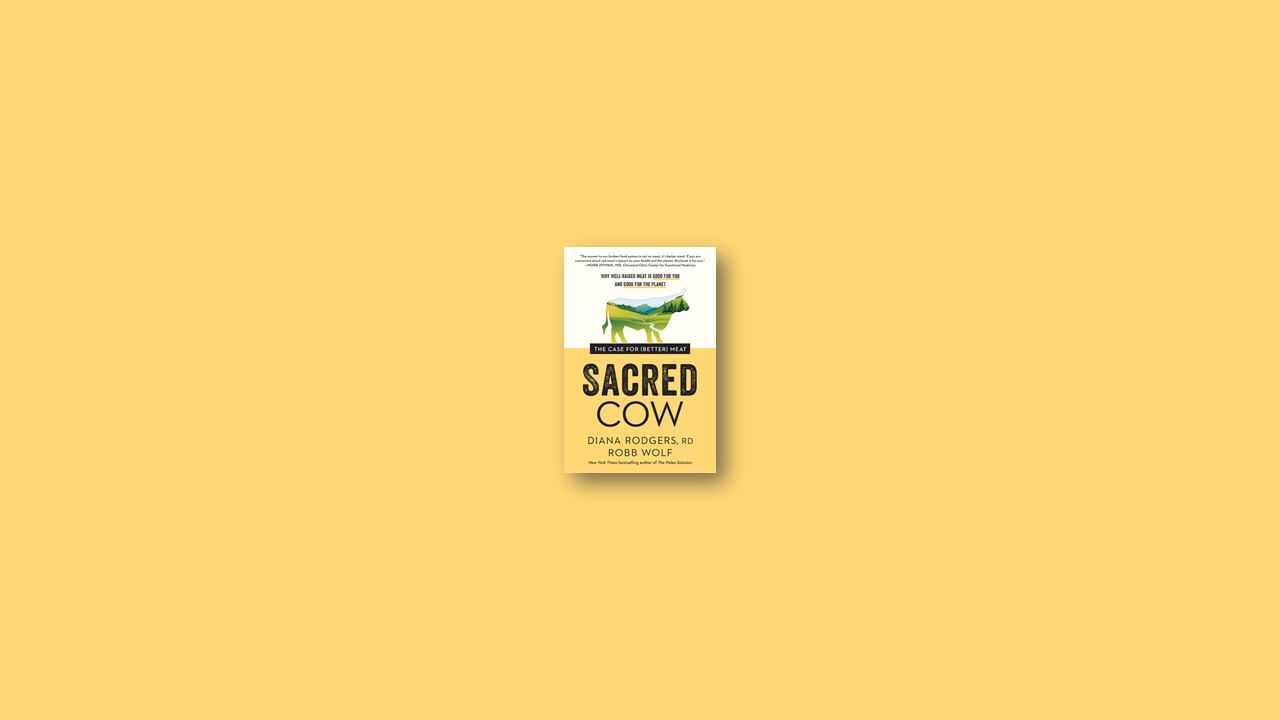Meat as Scapegoat
It’s commonplace today to blame meat for everything from cancer to global warming. We hope you can appreciate that addressing all these claims is a bit like a game of whack-a-mole. That said, in the last several years that we’ve both been talking about the benefits of better meat, we’ve been able to boil down the arguments against meat into three main subjects: nutrition, environment, and ethics. During any debate, once we’ve thoroughly addressed the nutritional case, the argument swiftly shifts to greenhouse gases, land use, water, sentience, intent, or least harm.
The depiction of red meat as our main dietary foe plays nicely into our current fears about a warming planet and the ethical and sustainability considerations of factory farming. This multitiered attack on red meat makes it out to be even more evil than fat or cholesterol ever could have been. (Ironically, it’s fantastic for food manufacturers, as they may capitalize on our concerns for the welfare of animals to peddle their ultraprocessed, artificial products that, as we’ll point out, are neither healthy, beneficial to the environment, nor cruelty-free.)
To many, it seems that eliminating or dramatically reducing our intake of meat is the solution to both our failing health and the warming planet. In January 2019 the EAT-Lancet Commission, a collective of nutrition experts aimed at defining a healthy, sustainable food system for the entire planet, released their recommendations. Although there was some wording that this “one-size-fits-all style” may not be appropriate in all areas, there seemed to be little allowance or acknowledgment of cultural food preferences or regional food reliance. They call for less than half an ounce of beef a day (about half a meatball), less than one ounce of poultry, and one quarter of an egg—yet plenty of grains, industrially produced seed oils, and eight teaspoons of sugar.
What if we could help developing countries produce better meat, not discourage them from eating it altogether? When we assume that limiting most or all meat is the answer, are we ignoring some basic truths about how the human metabolism and nature work?
Are Humans Omnivores?
It’s tempting to think that the way our bodies are shaped—no claws, flat teeth—is all the evidence we need, and that we’re biologically designed to eat plants. Unfortunately, what this isn’t taking into account is our ability to make tools and fire. Humans can make arrows for hunting and sharpen stones and shells for scraping, pounding, and slicing meat. We don’t need claws or massive canine teeth in order to kill and digest meat. In fact, while some other primates do eat some meat, humans consume much more. The nutrients derived from these animal products provided to our brain is what separates humans from other primates.
On the flip side, when they did consume things like grains or legumes, traditional cultures used technology to soak, sprout, and ferment them to both reduce plant toxins and improve digestibility. Our point is that if one points to our lack of large canines as “proof” we are not designed to eat meat, is it reasonable to just ignore the technology we also needed to eat most plants?
Moving on to our anatomy, humans have distinct features that make us able to eat both plants and animals. As mentioned, our small intestines are longer than the average primate’s, and our colons are smaller. This means we are not as able to break down certain plant fibers or other types of bulky plant materials (as our gorilla relatives do so well).
Also, with a larger small intestine, we’re adapted to eating nutrient-dense foods like meat and cooked starches because we are able to better absorb the nutrition from these foods. We also have different enzymes than other primates that allow us to digest dense starches and dairy. Finally, when it comes to our teeth, we have canines (for meat) and flat molars (for grinding plants). So we are equipped for chewing both plant and animal foods.
Accepting that humans have in fact evolved to eat meat, we’ll now turn to another idea: how much meat we should be eating.
Are We Eating Too Much Meat?
Your body needs protein, and if you don’t get enough through diet, your body will start breaking down your muscles and other tissues in order to get it. This leads to muscle wasting and weakness. Immune function decreases because protein is required for antibodies. You also need protein to make enzymes and to carry oxygen to tissues, so low protein can cause lethargy. Low protein is also associated with hair loss, brittle nails, and cold hands and feet. Low protein can cause weight gain
In summary, it’s incredibly confusing to determine how much protein to eat and the recommendations don’t really seem to be based on much science, due to the inaccuracy of nitrogen balance studies and the gigantic ranges from the AMDR.
As a very reasonable starting point, it seems that 100 grams of protein on a 2,000 calorie diet is a great place to begin if you’re consuming less, and many people are eating much more than 2,000 a day, so this means beef up your protein, folks. Most Americans report eating between 1,800 and 2,500 calories per day (and self-reported data is usually on the low end), so this means at 20 percent of calories, intake for many Americans should be between 90 and 125 grams of protein per day. We see great success with people upping their protein to 30 percent of total calories.
Even If Meat Isn’t Bad for Me, Can’t I Get All My Nutrition from Plants?
The studies condemning meat are based on observational research and food frequency questionnaires, which are full of bias and flawed methodology. Observational research can only show associations, not prove causation. Studies that have adjusted for confounding factors (smoking, drinking, and other lifestyle factors) have shown no difference in mortality between those who eat meat and those who don’t.
humans are omnivores, we have been eating animal products for a very long time, and animal protein and fats contain many of the critical components we need to thrive. Those who eliminate meat from their diets, especially pregnant women and young children, are putting themselves at risk for nutrient deficiencies, some of which could even lead to permanent brain damage if there’s no intervention.
All right, then, you might say. Even if meat isn’t bad for my health, raising cattle for food is still environmentally irresponsible and ethically questionable, right? While we don’t see a huge nutrition benefit to choosing grass-finished beef over typical beef, there are certainly very good reasons to choose cattle managed and handled well.
Is Eating Animals Immoral?
At the end of the day, blood is spilled, and lots of harm is caused in the production of produce. It’s impossible to limit the idea of least harm to flesh on the plate. If you know that your actions will cause death as a side effect, and you still do it, then you are causing death. If you didn’t intend to kill something, but something is killed as a known side effect of your actions, does this somehow make it OK?
Let’s consider a hypothetical scenario. If you drive to a certain store to buy some tofu and accidentally run over a chipmunk on the way, did you still kill it? Yes. But do you have any guilt or culpability? Maybe not. It is clear that you had neither foreknowledge nor intention that your driving would kill the chipmunk. But what if you knew, for a fact, that each time you went to that store to buy tofu, you were definitely going to run over an entire family of chipmunks on your way. If you know that you are going to kill the chipmunks on the way to the store to buy tofu, is it still morally OK to go to the store, even if you’re not intending to kill the chipmunks?
If you’re aware that your actions cause a known effect, then intent is present. If you value the lives of rabbits or chipmunks as much as that of a cow, and are truly looking to kill the least amount of lives to feed your own, then we propose that killing one well-raised cow that lived on pasture is actually causing less death than the number of animal lives that are lost by modern row-cropping techniques.
Feeding the World
There are a lot of things we as individuals can do to live healthier and more sustainable lives. Many aren’t food related, but because nutrition is our wheelhouse and counts for a large part of human health, we’ll be spending the most time on how to improve your diet.
#1 KEEP YOUR DOLLARS LOCAL
Shopping locally and supporting food producers who are doing it right is not only healthier and better for the environment; it also supports local economies. When you buy things from multinational corporations, very little of your money actually supports the person who grew or made that product.
#2 AVOID DEBT
Although this is not really within the scope of our book, we both feel strongly that living within your means and not being a financial burden on society is critical to a sustainable world. Buying things we don’t need (and can’t afford) creates a huge carbon footprint, and debt is not only stressful—it’s wasteful.
#3 GET INVOLVED WITH YOUR FOOD
Growing your own food or volunteering at a local farm is one of the healthiest hobbies. Victory gardens were popular during World War II when the country faced food shortages. Diana’s farm has hosted gyms to do “farm fit”–type workouts and also offers “work-for-share” programs where folks can help out on the farm in exchange for vegetables. This is a win-win for everyone, and let me tell you, real farmer’s carries are no joke!
#4 SHOW YOUR KIDS HOW REAL FOOD IS GROWN
Introduce your kids to farming and food production. Kids who spend more time in nature are more likely to become conservationists in the future.
#5 FOLLOW A HEALTHY LIFESTYLE
Keeping yourself healthy reduces your individual burden on society, and it happens to make for a much more pleasurable way to live. In addition to diet, there are quite a few things you can do in order to improve your health. Getting adequate sleep is probably the most important factor. Even on a perfect diet, if your sleep isn’t dialed in, your brainpower will suffer and excess weight can be an issue.


